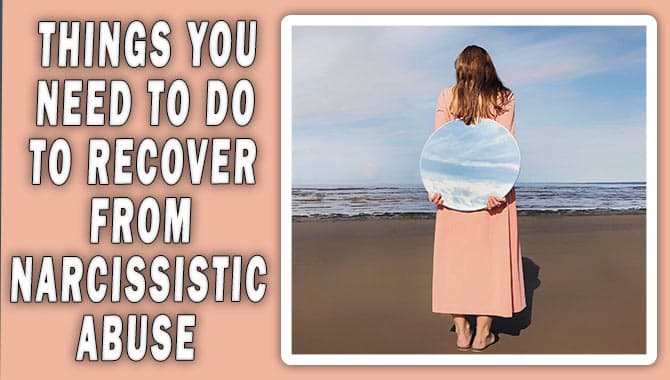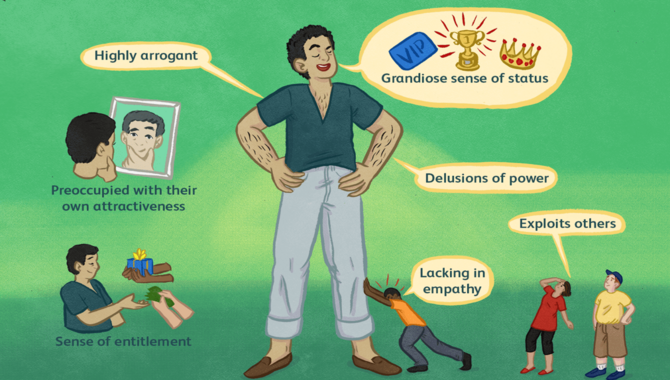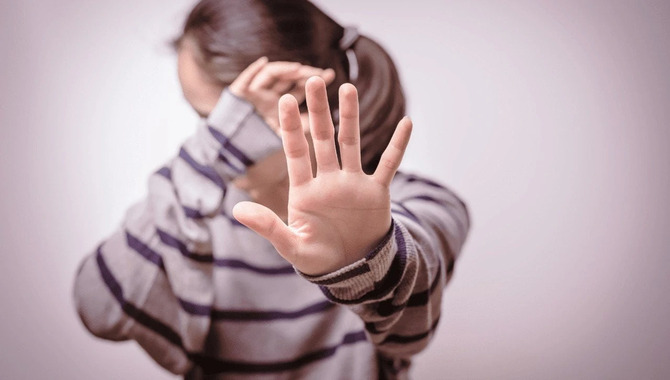If you’re one of the millions who have been victims of narcissistic abuse, you know it’s not a nice experience. Narcissistic abusers control and manipulate their partners in a way that causes immense emotional pain and suffering.
If you’re feeling lost and alone after being in a relationship with a narcissist, don’t worry. There are things you can do to start healing. This blog offers tips on recovering from narcissistic abuse based on real-world experiences of people who have survived this type of abuse. Keep reading to learn what you need to do to get your life back on track.

Narcissist In Relationships

In narcissistic relationships, one party abuses the other for emotional validation and control. This behavior can be incredibly abusive and damaging, leading to long-term emotional scars. It’s essential to understand narcissistic personality disorder and the abusive behavior that occurs within it to recover from narcissistic abuse.
Once you do, you can start to put together the puzzle pieces and begin healing the emotional damage. It’s a process, but with patience and support, healing can begin.
What Is Narcissistic Abuse?

Narcissistic abuse is a type of abuse that occurs when one person dominates and controls another person through psychological and emotional means. This can involve humiliating, belittling, and positioning the other person below them to gain Narcissist’s pleasure or satisfaction.
It can be extremely difficult to recover from narcissistic abuse because it causes serious damage to the victim’s self-esteem, self-worth, and identity. Victims may feel like they have no control over their own lives and constantly feel like they’re walking on eggshells to please their abuser. They may also struggle with anxiety, depression, and relationship problems and sabotage their own success to keep the relationship going.
15 Tips To Recover From Narcissistic Abuse

If you or someone you know is in a relationship where one person is abusive and self-centered, it’s time to get help. Narcissistic abuse is a type of emotional abuse that involves using someone for your own needs. This abuser views themselves as superior to the victim and expects them to do everything they say.
The victim may feel helpless and trapped in the relationship. Recovery from narcissistic abuse requires professional help – don’t try to self-heal this condition alone. Getting professional help will allow you to process the abuse and start rebuilding your life. It’s important to remember that abuse is never the victim’s fault – it’s the abusive person’s fault.
1. Label The Abuse
It is very important to identify narcissistic abuse for what it is. This type of abuse involves the abuser needing to be in control and putting their needs before the victims. It often starts with verbal insults or put-downs but can quickly escalate into emotional, financial, and physical abuse.
By writing down what happened and talking about it with someone you trust, you are laying the groundwork for healing. Remember that this process will take time – don’t expect things to get better overnight magically.
2. End The Relationship (If You Haven’t Already)
If you are in a relationship with someone narcissistic, it is important to end it. Narcissistic individuals cannot and will not change – they only care about themselves. It would be best if you protect yourself and your well-being above all else; let go of the idea that the Narcissist will eventually change; they won’t.
Remember that this was never about you – it was always about them and their needs. By breaking up with someone like this, you may feel like an outcast at first, but in the long run, it will be for your good.
3. Set Clear, Defined Boundaries
Boundaries are essential in any relationship. When dealing with someone selfish, knowing where your boundaries lie and how to enforce them can be hard. However, setting clear boundaries allows you to maintain control and keep yourself safe.
Make sure you clearly communicate your needs and desires for the other person to understand what is acceptable behavior from them. Accepting abusive behavior won’t make it okay – instead, fight back. It might take time, but healing from narcissistic abuse eventually happens – never give up on yourself.
4. Avoid Retaliation
Retaliation is one of the most harmful things you can do in a relationship. It typically leads to further pain and distress for both parties involved. Therefore, keeping a positive mindset when healing from abuse is important. Don’t engage with your abuser – they only want to hurt you more than anything else.
Instead, find support from family, friends, or professionals who can help you through this difficult time. Remember that healing takes time and patience, but eventually, recovery will be possible if you are brave enough to seek it out.
5. Seek Immediate Support
If you are in an abusive relationship, getting help as soon as possible is important. If you wait until things get worse – or even until the abuse becomes more frequent and severe – it may be too late. There are many resources available that can provide support during this difficult time.
Remember that healing takes time and patience, but with the right support, healing is possible. Make a list of the signs you have been subjected to narcissistic abuse and seek immediate support from a trusted person or organization.
Do not suffer in silence; talk about what’s going on for yourself so that someone can offer encouragement and hope instead of hurtful comments or judgments. Be kind to yourself; self-care is essential during these times.
6. Create A Consistent Schedule
Creating a consistent schedule is an important step in healing from narcissistic abuse. Following a proper schedule can get your life back on track and rewire your brain for the better. This process should include activities that make you happy and help you forget the abusive situation. Focusing on things that are positive and helpful in your life can do wonders in healing yourself emotionally, mentally, and physically. Remember – it’s never too late to overcome narcissistic abuse.
7. Anticipate Grief
Grief is a normal process that everyone goes through after a traumatic experience. It’s important to anticipate what might happen during this time and be prepared for the emotional roller coaster you are about to embark on. Recognize that your grieving process will take time – it may start slowly but could quickly rapidly build up as memories of abuse flood back.
Remember, there is help available; don’t try to deal with narcissistic abuse alone – seek professional help who can support and guide you through the healing process step-by-step.
Alongside professional support, consider seeking support groups or online communities that understand what you are going through and can offer consolation in times of need. Let go of the abusive person once and for all (perhaps by writing an honest breakup letter) and find someone new who will love, cherish, respect, care for, and protect you emotionally and spiritually.
8. Express Your Emotions
Expressing your feelings and emotions is crucial in healing from the emotional trauma you have experienced. By doing so, you can start to process what happened and begin healing. Talking to someone you trust will help ease the burden of carrying these heavy thoughts on your own. Remember that you are not alone – some people support and understand how you feel (even if they don’t know everything).
It’s important to remember that this experience is unique for every individual, making it hard for others to truly comprehend or relate to what we go through. However, by sharing our stories and reaching out for support, we can all learn from each other.
9. Rediscover Yourself
It can be really tough to start healing from a breakup or emotional or physical abuse. However, it is important to remember that you are not alone in this process, and there are many resources out there to help. One of the most important things you can do is rebuild your self-confidence.
This won’t happen overnight, but by taking small steps and focusing on your own needs, you will gradually regain control over your life again. You will also need time – healing takes time!
But with support from friends or family members who care about you, healing will definitely be possible. If professional help is needed during this process, don’t hesitate to seek assistance – it could be the best thing for both of your health.
10. Implement More Self-Care
Self-care is an essential part of recovering from narcissistic abuse. It helps you to get through the tough times by restoring your emotional, mental and physical health. To make sure that you are taking care of yourself the right way, make sure you schedule some time for relaxation and rejuvenation.
This might include yoga or meditation sessions, reading self-help books, spending time with friends/family members who can support and encourage you along the way, etc. Remember that recovery takes time, but it’s definitely possible.
11. Seek To Forgive Yourself
It is important to forgive yourself for getting hurt by your abuser. It can be healing to remember that you are not responsible for their terrible actions and that you need to focus on your own healing process. Seeking support from friends, family, or a therapist will help you heal properly and move on with your life. Remember that it is never too late to make progress in this difficult journey.
12. Take Time Before You Jump Into Dating
When it comes to dating, there are a few things you need to remember before jumping into anything. First and foremost, take the time to heal yourself. This will allow you to develop healthy boundaries and relationships with others in the future.
Make sure your partner knows what’s important to you so that both of you can move forward together in a positive fashion. Never let them control your life or make all the decisions for you – stand up for yourself! Remember, narcissistic abuse is never easy, but with patience and support, healing is possible.
13. Protect Yourself On Social Media
Social media can be a great way to connect with friends and family, but it’s important to be aware of the risks that come with it. The first step is to set up a protective shield. This means only following people who you trust and respect – this will help keep your social media account safe from abusive posts or comments.
If something negative does happen on social media, remember that narcissistic abusers will try to make you feel blamed for everything. Instead of letting them get under your skin, reach out for support groups or talk therapy in order to start healing from the abuse. Always remember – it is never your fault.
14. Create New Rituals
Rituals are important in our lives to help us deal with the trauma of narcissistic abuse. Creating new rituals that resonate with us and that reflect our values can be a great way to start healing. It’s important not to self-judgmentally berate ourselves but rather have a positive outlook on our recovery journey. Friends, family, or a therapist might be able to offer support when needed. Remember – it takes time and patience, but healing is possible.
15. Reflect On What You Learned
After reflecting on what you learned from this abusive relationship, it is important to remember that you are not alone. Millions of people have gone through a similar experience before you, and there are support networks out there for you to seek help
. It would be best if you also were grateful for the time that has passed – even though it was tough at times, it helped heal both of your wounds. And finally, don’t blame yourself – abuse is never your fault. Remember that healing takes time and patience – but with the support of friends or family members who care about you, healing can happen quickly and efficiently.
Narcissism And Sociopathy

If you’re feeling lost and alone in an abusive relationship, it can be hard to know where to turn. But there is help available! Narcissistic abuse and sociopathy are personality disorders that involve inflated self-esteem and an obsession with appearance or power. People who are narcissistic or sociopathic tend to be very determined to achieve their goals, even if it means hurting or controlling others.
If you’re feeling stuck in an abusive relationship, it’s important to seek help. There is hope available, and healing can begin. Remember that healing takes time and patience, but with the support of family, friends, and professionals, you can make it through.
What Narcissistic Abuse Looks Like In A Relationship

Narcissistic abuse is a form of emotional abuse that involves a person who has some type of power over you insisting on always being in charge, getting their own way, and treating you like your own personal servant.
This type of abuse can take many different forms, but it usually starts with the abuser making you feel inferior and insignificant. They may make you feel like you’re not good enough or that you don’t deserve to be loved. Narcissistic people may criticize everything you do and tell you that you’re stupid or ugly. They may isolate you from your friends and family or use them to get what they want from you.
If you’re in a relationship with someone who has narcissistic traits, it can be difficult to deal with. narcissistic abuse looks a lot different in a relationship than it does in an abusive relationship, but the signs are still there. If you feel like you’re always mistaken, that you’re not good enough, or that you’re being tyrannized and controlled, it’s time to get out.
Conclusion
Narcissistic abuse can have a devastating impact on both the victim and the abuser. If you or someone you know is in a relationship with a narcissist, it is important to know the signs of narcissistic abuse and how to recover from it.
Read through the tips provided to help you heal and move on from this abusive relationship. Remember, healing takes time and support, so please don’t hesitate to reach out for help. Thank you for reading our article on things you need to do to recover from narcissistic abuse.
Frequently Asked Questions
1.What Should I Do After Narcissistic Abuse?
Ans: After narcissistic abuse, abuse victims often feel lost and hopeless. It can be difficult to process the emotional pain and trauma that this type of abuse leaves behind. However, it’s important to remember that you are not alone. There is help out there, and you should seek professional help as soon as possible. Although the abuse is recent, healing from narcissistic abuse can take a long time.
2.How Long Does It Take To Recover From Narcissistic Abuse?
Ans: There is no one-size-fits-all answer to this question, as the amount of time it takes to recover will depend on a variety of factors, including your personal history and psychological makeup. However, in general, most people who have been through narcissistic abuse experience some form of recovery eventually.
3.How Do I Start A New Life After Narcissistic Abuse?
Ans: When you find yourself in a relationship that is abusive, it’s important to remember that you’re not alone. There are people who have been through similar situations and can offer support and guidance during your healing process. It’s also vital to get professional help as soon as possible. A therapist or counselor can help you work through your thoughts and feelings, as well as provide you with tools to deal with narcissistic abuse in the future.
4.Do People Heal From Narcissistic Abuse?
Ans: There is some debate over whether or not people heal from narcissistic abuse. However, most experts believe that the majority of victims do eventually recover.
The key factors that help victims heal include:
- Finding a support system
- Recovering your self-esteem
- Developing healthy boundaries
- Seeking professional help
5.What Bothers You The Most About Survivors Of Narcissistic Abuse?
Ans: The most challenging thing about recovering from narcissistic abuse is feeling understood. Many survivors feel like they’re always wrong or broken in some way, and it can be incredibly difficult to rebuild trust in relationships.

Leave a Reply